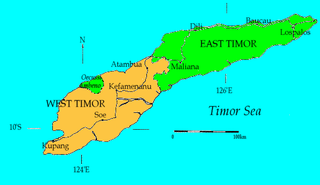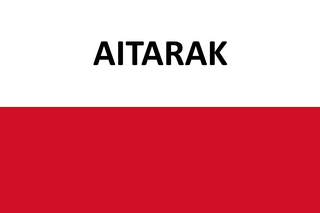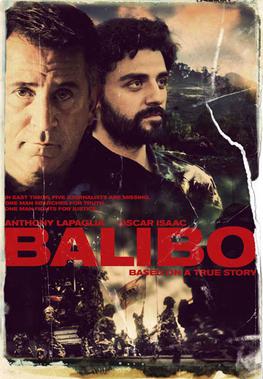
Portuguese Timor was a colonial possession of Portugal that existed between 1702 and 1975. During most of this period, Portugal shared the island of Timor with the Dutch East Indies.

East Timor, officially the Democratic Republic of Timor-Leste, is a country in Southeast Asia and Oceania. The country comprises the eastern half of the island of Timor and the nearby islands of Atauro and Jaco. The first inhabitants are thought to be descendant of Australoid and Melanesian peoples. The Portuguese began to trade with Timor by the early 16th century and colonised it throughout the mid-century. Skirmishing with the Dutch in the region eventually resulted in an 1859 treaty for which Portugal ceded the western half of the island. Imperial Japan occupied East Timor during World War II, but Portugal resumed colonial authority after the Japanese surrender.
The culture of East Timor reflects numerous cultural influences, including Portuguese, Roman Catholic, and Malay, on the indigenous Austronesian cultures in East Timor.

Balibo is a town in East Timor situated approximately 10 kilometres from the Indonesian border. It is located in the sub-district of Balibo, Bobonaro District.

Great Timor refers to the irredentist concept of a united and independent island of Timor, which is currently divided between the independent state of East Timor and the Indonesian territory of West Timor. The concept of unifying the island has been raised since the mid-20th century.

Aitarak was the name of one of the most feared pro-Indonesia militia groups in East Timor during the late 1990s. On April 17, 1999, the group conducted 12 murders at the Manuel Carrascalão House massacre in Dili. That same month members took part in the Liquiçá Church massacre. At its height, the group was led by Eurico Guterres.

The Catholic Church in East Timor is part of the worldwide Catholic Church, under the spiritual leadership of the Pope in Rome. Since its independence from Indonesia, East Timor became only the second predominantly Catholic country in Asia, a legacy of its status as a former Portuguese colony. About 98.3% of the population is Catholic in East Timor as of 2006, which means over 1,000,000 faithful.

Answered by Fire is a two-part television film based on the 1999 conflicts in East Timor that led to its independence in 2002. The film is based on "Dancing with the Devil: A Personal Account of Policing the East Timor Vote for Independence", which was written by David Savage, an Australian Federal Police Officer who was based in Maliana during the vote and where the fictional "Nunura" is based, who returned to East Timor to lead investigations into the crimes against humanity committed there. The book is published by Monash University Asia Institute, Melbourne David Savage was a technical and script consultant during the filming and also played a minor role.

The Armed Forces for the National Liberation of East Timor originally began as the military wing of the political party FRETILIN of East Timor. It was established on 20 August 1975 in response to FRETILIN's political conflict with the Timorese Democratic Union (UDT).

The Indonesian invasion of East Timor, known in Indonesia as Operation Lotus, began on 7 December 1975 when the Indonesian military (ABRI/TNI) invaded East Timor under the pretext of anti-colonialism and anti-communism to overthrow the Fretilin regime that had emerged in 1974. The overthrow of the popular and short-lived Fretilin-led government sparked a violent quarter-century occupation in which approximately 100,000–180,000 soldiers and civilians are estimated to have been killed or starved to death. The Commission for Reception, Truth and Reconciliation in East Timor documented a minimum estimate of 102,000 conflict-related deaths in East Timor throughout the entire period from 1974 to 1999, including 18,600 violent killings and 84,200 deaths from disease and starvation; Indonesian forces and their auxiliaries combined were responsible for 70% of the killings.

Lieutenant General (Ret.) Muhammad Yunus Yosfiah is an Indonesian politician and a decorated member of the Indonesian Army. Yosfiah served as Minister of Information of Indonesia in the Development Reform Cabinet between 1998 and 1999.

An independence referendum was held in East Timor on 30 August 1999. The referendum's origins lay with the request made by the President of Indonesia, B. J. Habibie, to the United Nations Secretary-General Kofi Annan on 27 January 1999, for the United Nations to hold a referendum, whereby the Indonesian province would be given choice of either greater autonomy within Indonesia or independence.

The Indonesian occupation of East Timor began in December 1975 and lasted until October 1999. After centuries of Portuguese colonial rule in East Timor, a 1974 coup in Portugal led to the decolonisation of its former colonies, creating instability in East Timor and leaving its future uncertain. After a small-scale civil war, the pro-independence Fretilin declared victory in the capital city of Dili and declared an independent East Timor on 28 November 1975.

The 1999 East Timorese crisis began with attacks by pro-Indonesia militia groups on civilians, and expanded to general violence throughout the country, centred in the capital Dili. The violence intensified after a majority of eligible East Timorese voters chose independence from Indonesia. Some 1,400 civilians are believed to have died. A UN-authorized force (INTERFET) consisting mainly of Australian Defence Force personnel was deployed to East Timor to establish and maintain peace.

Balibo is a 2009 Australian war film that follows the story of the Balibo Five, a group of journalists who were captured and killed while reporting on activities just prior to the Indonesian invasion of East Timor of 1975. The film is loosely based on the 2001 book Cover-Up by Jill Jolliffe, an Australian journalist who met the men before they were killed.

The Santa Cruz massacre was the murder of at least 250 East Timorese pro-independence demonstrators in the Santa Cruz cemetery in the capital, Dili, on 12 November 1991, during the Indonesian occupation of East Timor and is part of the East Timor genocide.

Nurkurniati Aisyah Dewi, better known as Nia Dinata, is an Indonesian film director. Her movies are known for tackling subjects controversial or "risky" in Indonesia such as homosexuality, migrant workers, and polygamy.

Izaak Huru Doko was a Timorese National Hero of Indonesia. He received this title on 3 November 2006.

Passabe, officially Passabe Administrative Post, is an administrative post in the Oecusse municipality and Special Administrative Region (SAR) of East Timor, which is an exclave surrounded on three sides by Indonesian West Timor. Its seat or administrative centre is the suco of Abani. In the 2004 census it had a population of 7,531 people in 1,153 households. Passabe is a small village (sulo) in the administrative post, very near the Indonesian border. It was the site of a massacre of East Timorese by pro-Indonesia militias in the follow-up to the 1999 referendum for East Timor's independence.

The East Timor genocide refers to the "pacification campaigns" of state terrorism which were waged by the Indonesian New Order government during the Indonesian invasion and occupation of East Timor. The majority of sources consider the Indonesian killings in East Timor to constitute genocide, while other scholars disagree on certain aspects of the definition.
















